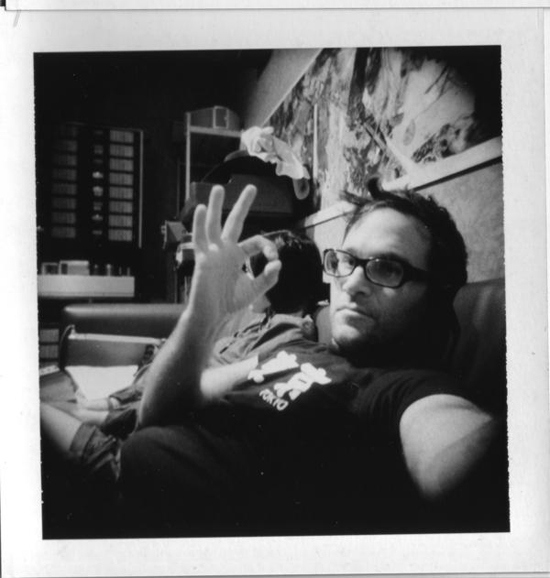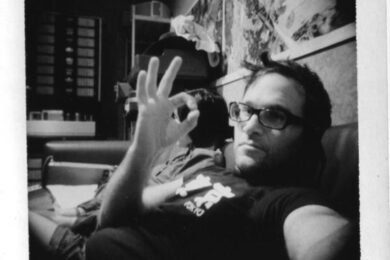People put their faith in the funniest of places. I, for example, believe that Brian Eno’s body will one day vanish completely, leaving his elegantly-sculpted, floating head to resurrect the long-defunct Gamesmaster franchise and begrudgingly dispense cheat codes to slack-jawed spods for the rest of eternity. Alas, I have no basis for such an assumption.
Interestingly, there are some people who think David Andrew Sitek is the future of music. Ever since his enshrinement at the pinnacle of NME’s ‘Future 50’ list in last year, one might be forgiven for picturing the TV On The Radio lynchpin and producer bent in furious concentration over a microscope in his Brooklyn laboratory, splicing rock’s DNA into new and exciting shapes no-one had ever dared dream possible.
He’s produced dough-faced Hollywood ingénues (Scarlett Johansson), fancied UK upstarts (Foals) and the cream of Brooklyn’s avant-garde elite (Liars, Yeah Yeah Yeahs, Telepathe). His band has been courted by David Bowie and hailed by seafarers and flat-earthers alike. Gee whizz, he even sports a mean stubble and comes clad in regulation meeja specs.
Now basking in a near-messianic glow after TVOTR’s third album, Dear Science, made a clean sweep in the end-of-year polls, the 37-year-old’s latest production exploits – on the Yeah Yeah Yeahs’ electro-tinged foray It’s Blitz! – earned still more plaudits from knock-kneed punters eager to spill hot words on the face of the future.
But another view would suggest this professor of postmodern pop’s knob-twiddling exploits are increasingly leaving genetic misfires in their wake; once-healthy subjects now grunting euthanasiac pleas through mouths crazy-paved with tooth fragments as they pad confusedly round their cells on hairy elbows.
Neither is strictly true, of course, but plotting a course between the two standpoints mare be a timely and instructive exercise. In fairness, Sitek has to date been lauded and criticised in fairly equal measure for his cerebral style of production, which in its purest expression with TV On The Radio manifests as a scratchy copper sheen of industrial ambience and incongruous, free jazz-influenced flourishes of brass.
It’s a sound which has often been described as easy to admire yet difficult to love, but it was the release of last year’s Dear Science LP – ironically billed as remedial of that particular complaint – which proved most revealing of his shortcomings as a producer. As the most optimistic utterance to date in an admittedly half-empty sort of oeuvre, this should have been a record to melt the hearts of the detractors and reveal Sitek’s studio sorcery in a new and altogether more human light. Instead, critics just pretended it was.
The problem? A gap between intended joy and perceived aloofness you could drive the flipping Vengabus through; a disparity between lyrical intent and musical execution, dynamically shifting moods muffled by arrangements that seem overfussy, pompous or coldly mimetic of funky tropes. For the latter look no further than ‘Crying’ and first single ‘Golden Age’. Prince’s oft-abused spectre was dragged into the discourse surrounding this unlikely pair, yet in truth the former sounds polished and studio-bound, while the single never felt more than a sketchy conceit given an optimistically full-blooded treatment.
Most offputting of all is ‘Lover’s Day’, a song ostensibly celebrating the transcendental power of boshing the missus, where frontman Tunde Adebimpe’s promise to ‘break the back’ of a desired partner with his coital exertions sounds plain creepy when twinned with the leering horns and drunken military tattoo Sitek lays on as mood music.
The military motif resurfaces on ‘Skeletons’, a track from Yeah Yeah Yeahs’ It’s Blitz!, although this time around Karen O’s best ‘Maps’-ish moping stands in for queasy sexual release. The resulting dirge sounds like the Baywatch theme rendered on an orchestra of bagpipes, ball sacs tuckering up like frightened armadillos as Ms O keens unconvincingly over a guff-smelling breeze of faux-epic theatrics. His stamp is all over another ballad, ‘Little Shadow’, which hinges on churchy, far away-sounding synth and softly thundering drums. But emotionally speaking it’s as flat as week-old Panda Pops.
And speaking of the epically flat, how about Scarlett Johansson’s dubious, Sitek-assisted gift to the music world in her collection of Tom Waits covers from last year, Anywhere I Lay My Head? This is a trickier one, admittedly, since the raw promise of the base material our Dave has to work with here is more legitimately in doubt. But while the odd track succeeds in making our moonlighting heroine sound statuesque or even sepulchral (‘Falling Down’, especially), most of Sitek’s handiwork here is as gauzily overwrought as Johansson’s vocals are lifeless and dull. And how much of it actually engages with Waits’ original sentiments is anyone’s guess.
With Foals’ debut Antidotes Sitek’s error lay in grafting a third dimension onto a bunch of songs that fundamentally work best in two – listen back to those blaring horns on ‘Cassius’ again (provided by Brooklyners Antibalas presumably at Sitek’s behest), and think what phrases come to mind. Counter-intuitive? ‘Brave’? Or is it simply that the sounds don’t belong in that particular song? Debatable, perhaps, but between slowing the tracks down and fleshing them out sonically for a wider audience, Sitek exposes the dearth of pathos or humour at the heart of a band whose principal strength derives from their ability to maintain a frenetic pace.
Such a critique might contain the seeds of a riposte if you reflect that Foals most likely do consider themselves a far edgier, more rounded proposition than reality would reasonably allow, that the Yeah Yeahs Yeahs were never much cop with ballads in the first place – well okay, with one glaring exception – and that Johansson has been guilty of confusing vacuity with ennui before. It’s just that for all his achievements – and I’d be stretching a point to frame the excellent Telepathe record as anything but – Sitek lacks a vibrancy and dynamism in the producer’s chair which puts him well shy of the greats he’s being increasingly banded with.



